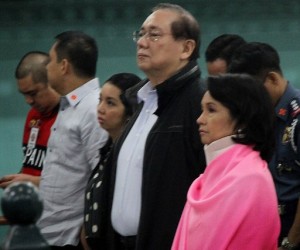
This handout photo taken on Oct. 29, 2012, shows former President Gloria Arroyo (right) accompanied by family members including her husband Mike Arroyo (2nd right), daughter Luli (3rd left), son, legislator Dato (2nd left), and party-list legislator Mikey (left), attending her arraignment on corruption charges at the anti-graft court in Manila. The government’s anti-corruption efforts helped push the Philippines’ global ranking in terms of economic freedom by 10 notches to 97th among 177 countries and territories. AFP PHOTO/ERNESTO LASIG / PNP-PIO
The government’s anti-corruption efforts helped push the Philippines’ global ranking in terms of economic freedom by 10 notches to 97th among 177 countries and territories.
This was according to the editors of the 2013 Index of Economic Freedom, jointly released by Washington D.C.-based The Heritage Foundation and The Wall Street Journal.
Based on the latest annual index, the 19th since it first came out in 1995, the Philippines scored 58.2 out of 100 points.
Such score keeps the Philippines in the category of “mostly unfree” countries or those within the range of 50 points to 59.9 points.
“(The) score is 1.1 points higher than last year, with notable improvements in investment freedom and freedom from corruption outweighing a decline in business freedom,” the editors said in a statement.
They added that such score was below the global average of 59.6, but noted that the Philippines’ improvement provided contrast to the world’s 0.1 point gain.
“The global advance toward economic freedom has ground to a halt,” they said. “Since reaching a global peak in 2008, economic freedom has continued to stagnate.”
Even then, the editors observed an overall positive trend in 2012, with 91 countries improving their scores compared to 78 that declined.
As for the Philippines, they noted that the government has pursued a series of legislative reforms toward an improved business environment that encourages broader-based job growth.
Still, the editors said Philippine institutions needed “deeper commitment to reform.”
“Although the perceived level of corruption has declined in recent years, more effective anti-corruption measures need to be institutionalized,” they said.
“The inefficient judiciary remains susceptible to political interference and does not provide strong and transparent enforcement of the law, undermining prospects for long-term economic development,” they added.
The index takes into account 10 criteria, including property rights, freedom in trade and financial freedom—of which the Philippines’ record showed no change from the previous year. This suggested a need for improvement in terms of market liberalization.
The country improved in terms of government spending, freedom from corruption, fiscal freedom and investment freedom.
However, the Philippines worsened in terms of business freedom and freedom in trade. This meant that the regulatory environment has become more inefficient.
Hong Kong remained the “freest” economy for the 19th time with 89.3 points. Mainland China placed 136th while Taiwan ranked 20th.
There were only four others in the league of “free” economies or those with scores of 80-100. These were Singapore, Australia, New Zealand and Switzerland.
North Korea retained its bottom rank at 177th with 1.5 points, improving from the previous one point. It was among 32 other “repressed” countries, all scoring less than 50 points.

